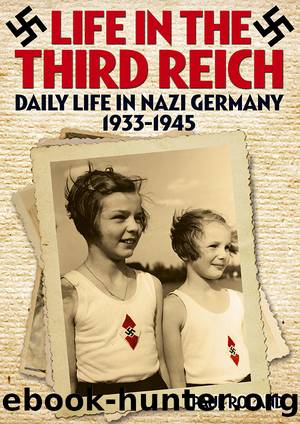Life in the Third Reich: Daily LIfe in Nazi Germany, 1933-1945 by Paul Roland

Author:Paul Roland [Roland, Paul]
Language: eng
Format: epub
Tags: 20th Century, Europe, Fascism & Totalitarianism, Germany, History, Military, Social History, World War II
ISBN: 9781784281137
Google: n3GdCgAAQBAJ
Amazon: 1785990926
Publisher: Arcturus Publishing
Published: 2015-06-17T03:00:00+00:00
Visitors to Nazi Germany were left in no doubt that they were in a totalitarian state.
There was the promise of work for the unemployed, equal opportunities for everyone once the Jews had been legally excluded from the universities and professions, a level playing field for small businesses once the Jews had been forced out of theirs, long-term contracts for industry, a fully conscripted Armed Forces for the High Command, vital tasks for civil servants, prestigious titles for the bureaucrats and a new racially themed curriculum guaranteeing employment for the teachers. Even the ordinary housewife found her unpaid efforts in maintaining the home acknowledged and there were medals for mothers who bore the most children.
And for those lowly individuals without official status who desired to be known and to exercise power over their neighbours, there was the opportunity to be employed as block warden of their apartment building and play the intimidating role of informer.
In Berlin-Dahlem, Christabel was confronted with the fact that Herr Neisse, her gardener, now had the power to have her and her neighbours arrested on the merest suspicion of disloyalty. A careless remark or a failure to contribute generously to party collections could have fearful consequences.
Herr Neisse was typical of the âcommon peopleâ who had put their faith in Adolf Hitler after losing what little savings they had in the Depression. They identified with the Führer with whom they shared humble origins and modest aspirations. And they had no reason to doubt him when he identified the cause of their plight and guaranteed to make sure they had work and food for their families if they put their trust in the party and their mark in the appropriate box on their ballot papers.
Just like Corporal Hitler, Herr Neisse had fought in the Great War and he had worked hard on his return, saving up his marks and pfennigs for ten long years so that he would have enough to marry his sweetheart. He could not understand how some had profited from the hyperinflation of 1923, brought about when Germany defaulted on a reparations payment, while he had had his life savings wiped out and been reduced to living in poverty.
He had no particular disliking for Jews but he had come to resent what the Führer had called âinternational Jewryâ, a mythical cabal of anonymous individuals who were apparently to blame for all of Germanyâs ills. Whether he truly believed in this convenient scapegoat or not, it served to explain what he didnât have the education or experience to understand. Besides, Herr Hitler was so convincing it would be ungrateful to doubt him. The Führer was devoted to Germany and he must have a good heart as he was routinely photographed with small children and dogs. Who could doubt his sincerity?
But true believers such as Herr Neisse were stumped when asked why the Führer had signed a non-aggression pact with the Bolsheviks, who only a week before had been caricatured on party postcards wielding vicious whips over defenceless German women and children.
Download
This site does not store any files on its server. We only index and link to content provided by other sites. Please contact the content providers to delete copyright contents if any and email us, we'll remove relevant links or contents immediately.
Room 212 by Kate Stewart(5102)
The Crown by Robert Lacey(4799)
Endurance: Shackleton's Incredible Voyage by Alfred Lansing(4749)
The Iron Duke by The Iron Duke(4345)
The Rape of Nanking by Iris Chang(4194)
Joan of Arc by Mary Gordon(4091)
Killing England by Bill O'Reilly(3989)
Say Nothing by Patrick Radden Keefe(3974)
I'll Give You the Sun by Jandy Nelson(3424)
Shadow of Night by Deborah Harkness(3352)
Hitler's Monsters by Eric Kurlander(3327)
Mary, Queen of Scots, and the Murder of Lord Darnley by Alison Weir(3194)
Blood and Sand by Alex Von Tunzelmann(3188)
Eleanor & Park by Rainbow Rowell(3147)
Darkest Hour by Anthony McCarten(3117)
Margaret Thatcher: The Autobiography by Thatcher Margaret(3072)
Book of Life by Deborah Harkness(2921)
Red Famine: Stalin's War on Ukraine by Anne Applebaum(2916)
The One Memory of Flora Banks by Emily Barr(2853)
